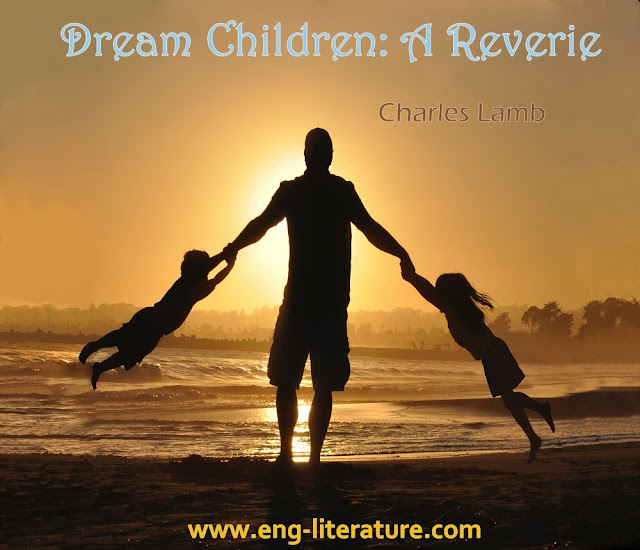Wordsworth’s “Lamb,
the frolic and the gentle” was a refined humorist whose smile could be
both satirical and tender. In him humour and pathos are, indeed, very often
allied. Lamb could not prevent his mind from passing at times to the sadder
aspects of life, and there is belief that he laughed to save himself from
weeping. Laughter is followed by tears of
sympathy in many of his essays. In fact, Lamb’s personal life was full of disappointments
and frustrations. But instead of complaining, he looked at the tragedies of
life, its miseries and worries as a humorist. Dream Children: A Reverie is a true testimony of his
blending of humor and pathos in a single row.
The whole essay permeated with a
note of heart sob. With the “viewless wings of poesy” he
journeys back to the good old days and pops up stories in front of his dream
children. He relates his childhood days, of Mrs. Field, his grandmother and
John Lamb, his brother. He describes how fun he had at the great house and
orchard in Norfolk. Of his relations he gives us full and vibrant pictures –
his brother John (John L-), so handsome and spirited youth, and a ‘king’. John
was brave, handsome and won admiration from everybody Charles’ grandmother Mrs.
Field is the other living picture. She was a good natured and religions –
minded lady of respectable personality.
Charles Lamb’s sweet heart Alice
Winterton is the other shadowed reality. The Dream Children, Alice and John are
mere bubbles of fancy. Thus Lamb’s nostalgic memory transports us back to those
good old days of great grandmother Field. But even in those romantic nostalgia
the hard realities of life does not miss our eyes. Death, separation and
suffering inject us deep-rooted pathos in our heart. Whereas Mrs. Field died of
cancer, John Lamb died in early age. Ann Simmons has been a tale of unrequited
love story of Charles Lamb. Notably the children are millions of ages distant
of oblivion and Charles is not a married man but a bachelor having a reverie.
In his actual life Lamb courted Ann Simmons but could not
marry her, he wanted to have children but could not have any. Thus he strikes a
very pathetic note towards the end of his essay when he puts the following word
in front of his imaginary offspring:
“we are not of Alice, nor of thee, nor are
we children at all … We are nothing, less than nothing, dreams. We are only
what might have been”.
Lamb’s humour was no surface play,
but the flower plucked from the nettle of peril and awe. In fact, Lamb’s humour
and pathos take different shapes in different essays. Sometimes it is due to
his own unfulfilled desires, sometimes it is due to the ill-fortunes of his
relatives and friends and on some other occasions it is due to his frustration
in love etc.
In any well-balanced piece of writing, humor is supplemented
to pathos. Our present essay also appropriates this trademark features. Lamb’s
widowhood and parenthood both arouse laughter and sorrow. But the most
exuberant source of humor is his fictitious creation of children. In fact, the
subtitle of the essay – ‘A Reverie’ which literally means a daydream or a
fantasy – prepares us for the pathos of the return to reality although the
essay begins on a deceptively realistic note.












0 Comments
Post a Comment